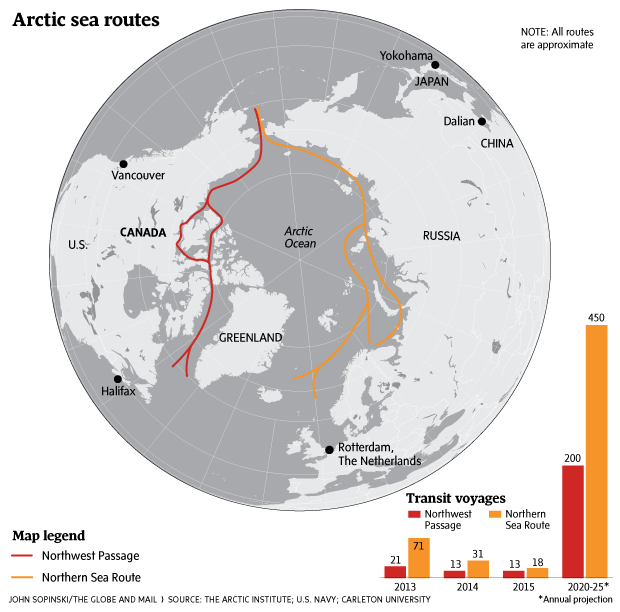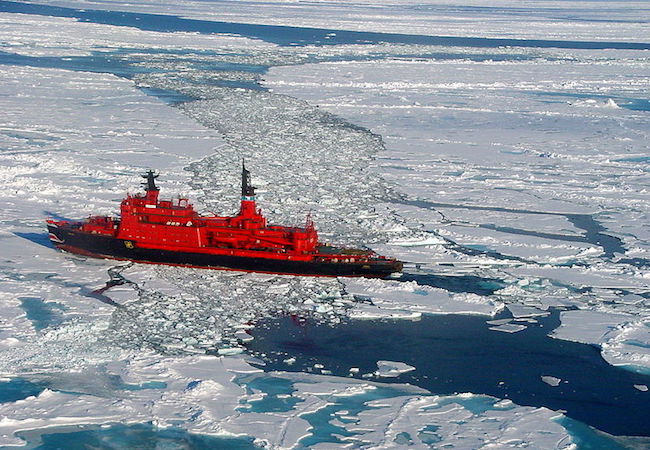
By David McDonald
The effects of Global Warming on our planet are now irreversible. Various studies have outlined the impacts human actions have had on our planet, but more notably, our oceans.
Things like ocean heat, ocean surface temperature, sea levels, and acidity will drastically change the chemistry of our oceans in the next several decades. This is a stark realization, and even more concerning is the fact that, “even if carbon emissions stopped completely right now, as the ocean’s catch up with the atmosphere, the Earth’s temperature would rise about another 1.1F (0.6C). Scientists refer to this as committed warming.”
If we stop emitting today, it’s not the end of the story for global warming. There’s a delay in temperature increase as the climate catches up with all the carbon that’s in the atmosphere. After maybe 40 more years, the climate will stabilize at a temperature higher than what was normal for previous generations.
Among all regions on the planet, the northern Arctic’s climate is rising faster than anywhere on Earth. According to the WWF, this is happening because, “Shiny ice and snow reflect a high proportion of the sun’s energy into space. As the Arctic loses snow and ice, bare rock and water absorb more and more of the sun’s energy, making it ever warmer. This is called the albedo effect.”
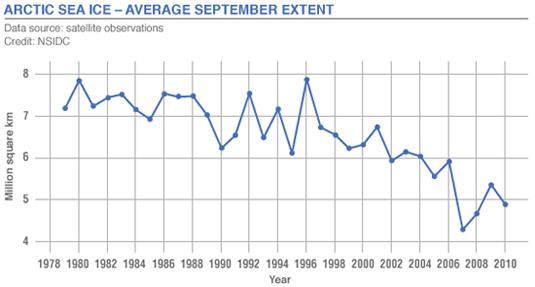
Human consumption of fossil fuels isn’t expected to slow down anytime soon, and will continue long past this century considering that we have enough untapped resources to last us at least a few hundred more years if we remain at our current level of consumption, which means global warming in the Arctic won’t be slowing down anytime soon.
We can conclude from all of this that temperatures will continue to rise, ice will continue to melt, and various species will be cast off the face of the Earth. However, global warming in the Northern Arctic is creating a controversy for Canada, one that has economic, political, and environmental implications.
Freight shipping through the North Western passage in the Arctic will increase drastically in the coming decades
The Northwest Passage is a sea route connecting the northern Atlantic and Pacific Oceans through the Arctic Ocean, along the northern coast of North America via waterways through the Canadian Arctic Archipelago. Transportation along the passageway began in 1906, but due to regular ice coverage, commercial use hasn’t been possible until recently.
On August 21, 2007, the Passage became open to ships without the need of an icebreaker. According to Nalan Koc of the Norwegian Polar Institute, this was the first time the Passage has been clear since they began keeping records in 1972. The Northwest Passage opened again on August 25, 2008.
Thawing ocean or melting ice simultaneously opened up the Northwest Passage and the Northeast Passage (and within it, the Northern Sea Route), making it possible to sail around the Arctic ice cap. Awaited by shipping companies, this ‘historic event’ will cut thousands of miles off their routes.
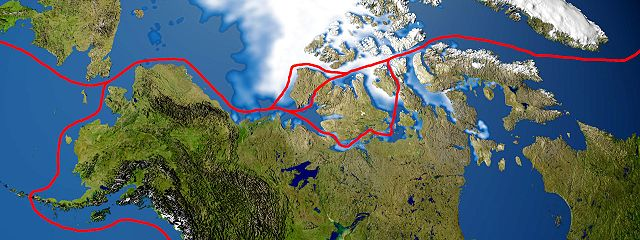
Currently, the types of commercial shipping activity currently taking place in the Canadian Arctic consist of community re-supply; bulk shipments of raw materials, supplies and exploration activity for resource development operations; and tourism. As of now, many of these ships travel South through the panama canal, or across Northern Europe and Russia. However, the opportunity to ship goods through the Northwestern passage will become quite profitable as it will trim a considerable amount of time off of expedition times, as well as cut fuel costs.
This has been called a historic event mostly by those holding economic interests in the area (i.e. Russia, China, and the freight shipping companies owned by them.)
Countries like China and Russia have already seen future opportunities in the Northwestern passage. China has released a Northwest Passage shipping guidebook that lays the foundation for cargo vessels to sail across the top of Canada – a plan that won’t be implemented for quite some time however.
In terms of Russia’s interests in the region, Putin has spoken at length about Arctic shipping, calling it the “Suez of the North,” in comparison, the Suez canal (which connects the mediterranean to the Red Sea) has over 17,000 ships pass through it annually. Putin also announced that Russia would build nine new icebreakers by 2020 and offer competitive tariffs to attract ships. His ministry of emergency situations would build depots of oil spill response equipment along the Russian coast.
Aside from Russia and China, the U.S. and Canada obviously have important roles in the establishment of this soon-to-be commercialized freight shipping route. Furthermore, most nations will be touched by developments in the Arctic because the region’s shipping, fishing, energy and mineral production, scientific research, and other activities affect national economic welfare and security. For instance, shorter trade routes through the Arctic could be a boon to export-driven nations like China. A voyage from Shanghai to Hamburg via the NSR (shown below in blue) shaves roughly 30 percent of the distance off a similar trip via the Suez Canal (shown in red), and it also avoids pirate-infested waters.
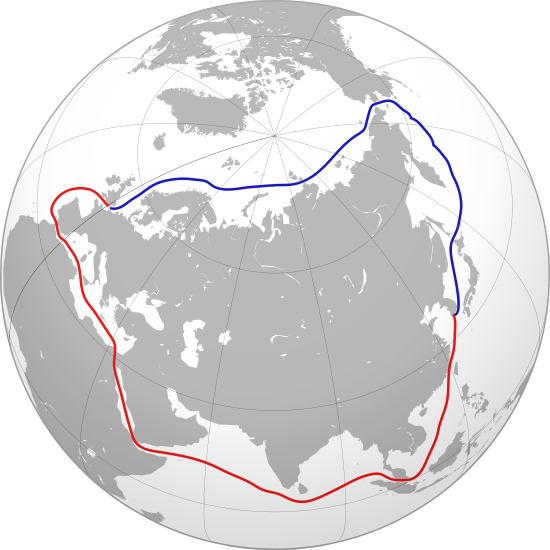
However, shorter shipping routes are just a small reason for interest in this area. The U.S. Geological Survey (USGS), estimated that nearly one-quarter of the earth’s undiscovered, recoverable petroleum resources lie in the region: 13 percent of the oil; 30 percent of the natural gas; and 20 percent of the liquefied natural gas. More than 80 percent of these are thought to be offshore.
“The extensive Arctic continental shelves may constitute the geographically largest unexplored prospective area for petroleum remaining on Earth,” – U.S. Geological Survey
This is a huge economic opportunity, and I can see why Putin would make such a large claim as to compare the Northwestern Passage to the Suez Canal – a passageway that generates $3 billion annually for Egypt a figure that accounts for 30-35% of the Egyptian economy.
Canada can potentially manifest a lucrative future by doing business in the Arctic, but they cannot do so by means of ownership, as most natural resources like oil and natural gasses are offshore. The land in the arctic is not highly valuable, it is the waterways, and what is beneath the water that people are after.
Canada can prioritize off this by establishing shipping interests in the region in coming years in order to compete with this growing market. However, the environmental impact of increased shipping in this area could have catastrophic consequences for wildlife in the region, as well as the overall environmental health of our planet.
According to Karl Magnus Eger, “In the Arctic region in 2004, approx. 609 tons of black carbon was released. Although this is a relatively low amount as compared to global emissions, as shipping traffic increases in the Arctic, the region specific effects of BC described above means that even small amounts could have potentially a disproportionate impact on ice melt and warming of the region.”
This is all relatively new data because commercial shipping in the Arctic has only recently become economically viable, and shipping near the Antarctic provides no economic benefit as of now. However, if shipping trends in the area continue, any oil leakage could prove catastrophic to the area. Even more concerning is the increasing carbon emissions that will be witnessed in the Arctic. CO2 has a much more drastic impact on the climate near the poles than it does near the equator, which is what has many worrying about possible commercial use of the Northwestern passage.
However, like it or not, freight shipping will open up along the Northwestern passage in the coming years – the environment will suffer, and shipping companies will profit greatly.
Canada currently lacks a large Arctic foothold, and must act to establish a presence in the Arctic.
As a point of comparison, Russia has several search-and-rescue stations in the Arctic and is building ten more – each with its own ships and aircraft. While Canada lacks a single port along the Northwest Passage in which a vessel could seek refuge in the event of mechanical problems or a serious storm. Russia has sixteen deep-water ports along its Arctic coastline.
If we are to compete with Russia, China, and the U.S. in the future, we must take action on this opportunity, while keeping the environmental implications in sight. This means setting up airports, cleanup stations, and small hospitals in the case of an accident. If there is a major oil spill, it will take a considerable amount of time for us to get up to the Arctic and assess the damage. There are billions of dollars to be made off the freight-shipping business in the region, as well as extraction of natural resources. Environmental implications from extracting natural resources has never stopped us in the past from capitalizing on such opportunities, but with where things are in terms of the health of our planet, our approach may be different.
Regardless of whether Canada is for or against capitalizing on economic opportunities in the Arctic, large-scale commercial use of the Northwestern passage will commence, and money will be made – whether Canada profits from this is up to our government regulations, as well as the actions of capital venturists. In my opinion, I think we should set up shop in the Arctic and watch the money flow in – for those arguing for the environmental consequences of this, I say, it’s going to happen anyway, so we might as well capitalize while the opportunity is here, and it will be here very soon.

